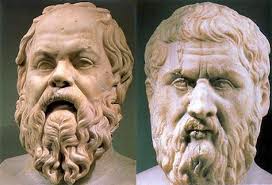Book I Summary
In this book, Socrates is in a small town outside of Athens for a religious festival. Just as the festival is concluding and he is about to leave, he is stopped by the sons of an acquaintance of Socrates. As they are traveling the subject of justice came up.
This turns out to be what the entire chapter is about. Each person gives their opinion on what justice is. In this chapter, Socrates does not actually define what justice is. He just argues against the other opinions of what justice and injustice is. One thing I want to point out is that I will not use names or summarize the chapter. I won’t mention that Cephalus thinks one thing and Polemarchus want to beat Socrates up. The reason is because trying to grasp 2400-year-old Greek names is difficult and the actual story is irrelevant to the ideas though it is interesting to see that people get pissed off when they lose an argument.
The first idea is that justice is one who follows his legal obligations, pays his debts and is honest. So if you owe a man money, it is just to pay the money back and injustice not to do so. But Socrates thinks this is wrong. He points out that some men are fools and will waste what he gets. Sometimes it might be better to keep the money until he is better able to deal with it. Another example would be borrowing a weapon from an insane man. Would it be prudent and just to give a mad man a weapon? Because it would endanger the lives of others, it would not be justice to return the weapon to its rightful owner.
Let’s say my friend loans me a shotgun so I can go hunting. I come back from my trip and find out he had a horrible fight with his girlfriend and they break up. When I talk to him, I find that he is angry, hurt and depressed. Would it be a good idea that I give him his shotgun back when he is in such a fragile state? Because I would be giving him a tool that could hurt him, his girlfriend or both, Socrates says it would be unjust to give him his property.
The second attempt at defining justice is from a young man (the son of Socrates’ friend). Justice is bringing friends help and causing harm to enemies. This argument shows the differences between the generations which is the goal of Plato. Though the two arguments may seem completely different, they aren’t. The first argument is made my an old, established and successful man. It is passive. This argument is made by a younger man who is trying to establish himself and is preparing for conflict. The younger man’s response is more aggressive.
Socrates has little problem blowing this argument out of the water. He says that human beings are not infallible. We may befriend bad people and have enemies that are virtuous. It is not just by helping a person without virtue yet attack those that are virtuous. He also says that friends and enemies change. Socrates also points out that it is hard to seeing causing harm, no matter to who, is justice in any way.
Then the discussion gets interesting. Enter Thrasymachus. Thrasymachus is a Sophist. A Sophist is a Greek teacher in philosophy. They are known to embrace human reason and be very skeptical of any moral standards, including that of justice.
Thrasymachus angrily enters the conversation. He states that justice is nothing more than the advantage of the strong. Thrasymachus doesn’t believe in moral concepts like justice and doesn’t really define it so much as he is delegitimizes it. He believes that concepts like justice are imposed on society by the strong and the desire to be just is unnatural. He believes it restrains us and we should ignore it entirely.
Life just got tough for Socrates. Before, all the discussions involved finding a definition for justice. Now he has to show that it has value and do it in front of someone who is hostile enough to want to fight him. This is the long part of the chapter.
The first thing Socrates does is to force Thrasymachus is to admit that he is promoting injustice as a virtue, not justice. He does this by pointing out that the only point, according to him, to life is to gather as much money and power as possible. The person with the most is considered the most virtuous. Socrates points out that injustice cannot be a virtue because it counters wisdom. The example he uses is one who has a skill that is virtuous like medicine, art and mathematics. The artist create art for the art itself and does not try to compete with other artists. For that, he’s paid for his art. A doctor does not compete with other doctors. He uses his wisdom for the benefit of the of the patient’s well-being and does not compete with any other doctors.
In short, justice is selfless and injustice is selfish.
Socrates points out that justice must exist even by the unjust. He uses the example of a gang of thieves. There must be justice, even among thieves, because if they followed Thrasymachus’ theory, the thieves would constantly be stealing from themselves and no one would trust or work with each other.
Thrasymachus is thoroughly beaten and knows it. The last point that Socrates bring is that justice is important to the health of the soul. Thrasymachus believed that justice is unnecessary and serves no point. Socrates points out that wisdom is a virtue of the soul. Since wisdom and justice are interrelated, justice must also be a virtue of the soul. Like good food and medicine makes a healthy body, virtues like wisdom and justice make for a healthy soul.
What Did We Learn
This chapter was just introducing us to justice and the subject. It also looked at the base philosophies on what justice is from the Hesiodic and the Sophist philosophy. Hesiodic philosophy studies a wide variety of philosophies from nature to divine justice. Unlike Sophist philosophy, morality and justice are embraced and debated. Plato’s goal was to have Socrates destroy the different takes on justice so that a new definition can be defined. Though justice is never defined in this first book, we see the direction Socrates is heading.
One of the best reasons to actually read the text as opposed to reading external resources suck as Spark Notes is to read how Socrates argues. He does not put words into the mouths of those he debates. He picks at their argument until the conclusion is undoubtedly what Socrates wants.
Because of some of the complicated explanations and lack of punctuation (quotes are not used) reading and understanding the debates can be very challenging. I had to read chapter 1 twice with outside resources. I am happy to say that chapter 2 is a lot easier to read and the the discoveries are really interesting.
What is really great is watching how Socrates debates. He doesn’t try to convince anyone of anything but uses the words of his adversary against him. He uses reason and his opponents own words against the argument. I have found that I have always done the same thing when I debate. I learned how to do this in a college speech and debate class. Now I know where the style came from.
And that is Book I of Plato’s Republic in a nutshell.

